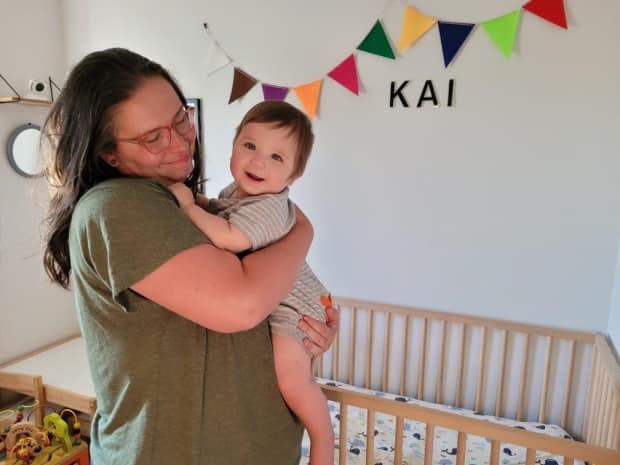More new parents seek mental health support, even as pandemic restrictions ease

Demand for mental health support for new parents has risen significantly in B.C. since pandemic restrictions began.
The Pacific Post Partum Support Society (PPPSS) logged around 6,000 calls in the first 12 months of the pandemic, an increase of fifty per cent on the previous year, and demand remains high.
Clare Zeschky, the volunteer coordinator at the PPPSS, says summer would normally be a quieter period for the non-profit. Instead, a steady stream of calls has meant the addition of eight new support groups to accommodate the growing need.
"That enormous change, of bringing a baby into your lives, is dramatic anyway and is already a recipe for creating a precarious mental health situation... So then to lose any support network you might have due to the pandemic, it just amplifies the whole situation," says Zeschky.
Rage, anxiety and depression
Acacia Tooth, 26, had her first baby in Esquimalt in October 2020. A week later her husband had to return to work, leaving her alone with a newborn and a growing sense of anxiety.
She struggled with feelings of failure after the home birth she had planned turned into a hospital C-section. The pandemic left her cut off from her family in Manitoba and concerned about financial stability, compounding her emotional challenges.
"I was mentally and physically exhausted ... and I found that played a big part in triggering my anxiety and my depression, my postpartum rage and being mean towards my husband and just not like myself," she said.

At four months postpartum, he gave her the nudge she needed to call the PPPSS.
"It was getting past the mental roadblock of like, 'No, I can do this,' and being stubborn about it, to realizing I definitely need outside help to fix this, because it's not going well."
Anxiety can also hit during pregnancy
Following the births of her two oldest children Jasmine Evanson, 35, of Maple Ridge, had already experienced bouts of anxiety that set in at around 11 months postpartum. During her third pregnancy, because of the pandemic, the feelings hit much earlier. She sought support from the PPPSS in her first trimester just as lock down began in April 2020.
"My normal coping methods weren't available to me anymore, I couldn't go for coffee with my girlfriend. Even though play groups are for the kids, they're really for the moms to talk to another adult .... The isolation was brutal."
The need continues
Nicole Fairbrother, the director of the University British Columbia's Perinatal Anxiety Research Lab, says the impact of the pandemic on clinical interventions and formal diagnoses of perinatal anxiety and depression, which happens around the time of birth, is still being studied.
What is well documented, however, is the increased need for perinatal mental health services this year, especially in the absence of the informal support systems new parents would normally have had.
This need extends beyond the birthing parent to partners and co-parents, many of whom have also struggled with pandemic-related anxiety and isolation, says Zeschky, adding that funding for perinatal mental health is down even as demand surges.
Alana Golub, 37, from Tsawwassen, is another support group attendee. She says she is feeling more hopeful now that public health restrictions have eased, but she believes many new parents have not even begun to process some of the complex emotions that came with giving birth during the height of the pandemic.
"I don't think a lot of this has been unravelled for us. It's kind of hard to remember, but there was no food on the shelves. Yes, now we're getting vaccinated and things are going in the right direction but really, have we looked back at what just happened? I don't think we have."

 Yahoo Finance
Yahoo Finance 